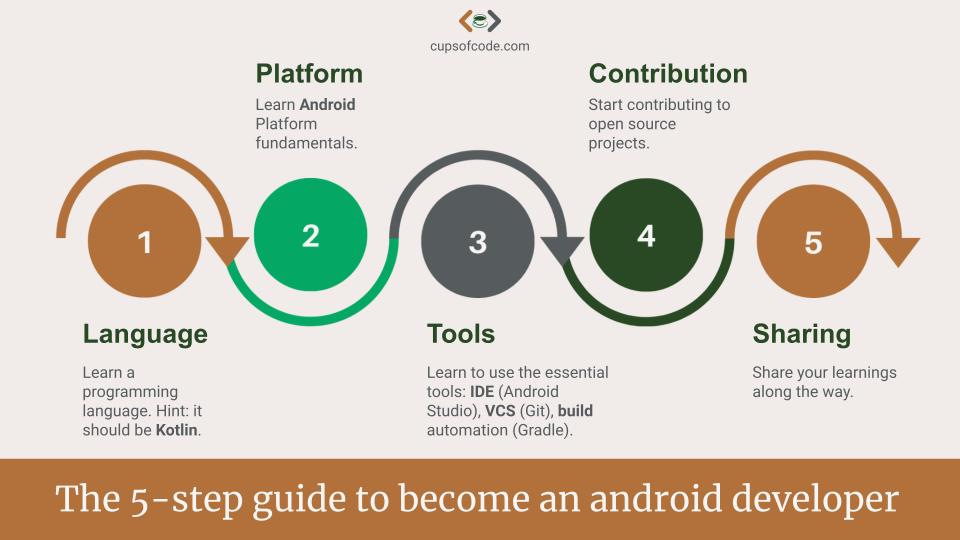So you want to become an Android Developer and don’t know where to start?
Here is my 5-step guide to becoming an Android Developer, jam-packed with action items after each step.
Presentation
.Video:
Table Of Contents:
1. Learn a Programming Language
Learning and knowing a programming language is essential in software engineering. There are two primary languages used in Android Development: Java and Kotlin. If you’re thinking about what to learn?
Kotlin is a first-class language for writing android apps. Why? It has an extensive list of features that help developers with day-to-day coding. It reduces the tedious boilerplate code developers have to write - meaning increased productivity. It helps to write safer code, which means fewer mistakes and crashes. And it is also Java language compatible - meaning developers can call java-based code from Kotlin or vice-versa.
When learning Kotlin, there are 3 pillars you should focus on:
- Syntax and idioms
- OOP (Object-oriented programming)
- Data structures and algorithms
Todo action items are on slide 5 .
2. Learn Android Platform Fundamentals
Android development is impossible without knowing the fundamentals of its platform. The platform itself consists of multiple different components. But the essentials to start developing apps include:
- App Components, Views, and Intents
- Context
- Handling app configuration changes
- Unit testing
- Multithreading
- Security
- Navigation
Todo action items are on slide 7 .
Once you’ve completed the essentials, the good to know topics are dependency injection and 3rd party libraries, and so on…
3. Get to know the Tools
Three most important tools every Android developer should know how to use: Android Studio as your go-to IDE, Git as your go-to version control system, and Gradle as your go-to build automation tool.
Android Studio is the official IDE (Integrated Development Environment) for building android apps. It’s based on top of IntelliJ’s IDEA and has tons of developer tools and features that help you write android apps for mobile phones, TVs, watches, auto, etc.
Version Control Systems (VCS) are designed to track changes in the codebase, coordinate work among developers, and allow them to reference older versions later. There are multiple types of VCS that exist, but the most popular one is Git. The popular repository hosting service for git is Github .
Gradle is a build automation tool to build, compile and publish apps. It’s already built-in in Android Studio.
Todo action items are on slide 9 .
Would you prefer courses? Then checkout which course will suit you best here .
4. Contribute to Open Source
Contributing to open-source projects might be a very time-consuming task, but it has some important outcomes that beginners can benefit from. It helps you learn more about projects, improves your coding skills, and helps the community and your peers get to know you. This recognition can bring a lot of opportunities in your career.
You don’t need to select a big, established open source project. It could be a small project that caught your eye on Github . In fact, most projects on Github are open to the public, therefore you can contribute to them.
There are many ways to contribute:
- Found a bug in a project? Open an issue!
- Found a typo in the documentation or there is an undocumented method? Open a pull request with the fix!
- A project has some open pull requests? Review them!
- Have a solution for one of the open issues? Open a pull request with the fix or new feature!
and so on…
Todo action items are on slide 11 .
5. Share Your Learnings
Did you build a Hello World app? - Share it! Share everything from your perspective on Android development, to where you seem to struggle most while learning to build apps.
The biggest benefit of sharing at the beginning of your career is that it’ll keep you accountable to code a little bit every day, thus learning something new every day.
Most beginners drop out here because they feel alone in this journey. But the actual truth is if you struggle, then there are others struggling too. Talk with others about your learning journey.
One place to put yourself out there is Twitter. If you don’t feel comfortable or shy putting yourself out there, start with Reddit, GDG local groups, Meetup, and share your experience there. When you join communities, it’ll help you to overcome the fear of asking for help. Thus, help you to grow as a developer.
Todo action items are on slide 13 .
Conclusion
The journey of becoming an Android Developer usually begins with learning a programming language. Kotlin is a recommended language for android app development.
Then it goes to learning the android platform fundamentals, understanding how an app communicates with the system itself, how the navigation is enforced, etc.
After learning the fundamentals, it’s time to start writing some code for an android project. And it’s impossible without knowing the tools that will help you write, publish and share the source code. The essentials are Android Studio, Git, and Gradle.
The last two steps are about accelerating and exposing you as a developer to the android community. Contributing to open-source projects help you to become familiarized with various codebases, write better code, and communicate with other contributors.
Last, but not least is sharing. Share your journey, learnings, and frustrations, because when you share, you keep yourself accountable to code a bit every day. And most importantly, to learn something new!
Ok, that’s the wrap!
Now go and start coding!
